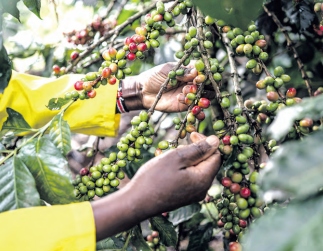
 A farmer picks coffee berries on a coffee farm in Kirinyaga County on December 20 last year/XINHUA
A farmer picks coffee berries on a coffee farm in Kirinyaga County on December 20 last year/XINHUA
Experts in Kenya’s horticulture industry have expressed concern over the rising number of interceptions in the country’s export trade.
They warned that these interceptions due to factors like pest issues and regulatory challenges, are a threat to the industry’s progress.
Agriculture Principal Secretary Kiprono Rono said this is coming at a time when the sector is expanding rapidly.
He noted that horticulture remains one of Kenya’s fastest-growing agricultural subsectors.
"However, the sector faces several challenges, including market access, sanitary and phytosanitary (SPS) requirements, and the need for infrastructure improvements," Rono said.
"Additionally, Kenya's vulnerability to climate change poses challenges for the resource-intensive horticultural processing industry."
Rono further noted that small-scale farmers struggle with various issues, such as limited access to inputs, regulatory compliance, market access, finance, and information.
These obstacles , he said, are compounded by intense competition both locally and internationally.
But despite these challenges, Rono noted that Kenya’s horticulture exports were valued at approximately 156.69 billion Kenyan shillings in 2023.
Dr Chagema Kedera, NExT Kenya Programme Coordinator at the Committee for Linking Entrepreneurship and Agricultural Development (COLEAD), also raised concerns over the increasing interceptions from 2018 to 2024.
Speaking at a stakeholder workshop for the closure of the New Export Trade (NExT) programme, Kedera attributed the rise in interceptions to issues such as the false codling moth.
Looking at interception data, Kedera noted that in 2018, there were 77 interceptions, a figure that rose to 87 by 2024.
"This increase is partly due to expanded acreage and the involvement of more stakeholders in the value chain," he explained.
The situation is more critical in the beans sector, where smallholder farmers produce the bulk of exports.
In 2018, there were only two interceptions related to maximum residue levels (MRLs), but by 2024, that number had risen to 41.
"To address this, we are looking at ways to ensure smallholders adhere to the necessary production systems, particularly in line with the PPP’s regime," Kedera said.
He further explained that, when viewed in context, the number of interceptions is minimal relative to the volume of consignments being exported.
However, harmful organisms pose a significant risk, and stakeholders are working together to ensure compliance.
"Efforts are focused on reducing the risk of non-compliance and ensuring that all parties in the value chain adhere to established regulations," he said.
Residue issues, particularly with beans, have also contributed to the increase in interceptions.
Kedera noted that the competent authorities, business member organizations (BMOs), and exporters are collaborating to reduce the presence of harmful residues using good agricultural practices (GAPs).
Despite these challenges, Kedera noted that the evolving international regulatory environment does not deter development.
"Our trading partners’ regulatory requirements are always changing, and exporters are working diligently to stay compliant," he said.
He acknowledged that while the horticulture value chain faces ongoing compliance challenges, efforts are underway to develop a systems approach to guarantee the safety and quality of exports.
"We have defined what every producer of roses must do from planting to export. We are confident these measures will address the issues at hand," Kedera stated.
The collaboration between Micro, Small, and Medium Enterprises (MSMEs), BMOs, and competent authorities remains key to addressing issues within the value chain.
For example, in the avocado value chain, the creation of a good practice guide has been instrumental.
Kedera added, "This guide has been broken down into smaller, accessible units that can be used at various stages of production to ensure compliance. Similarly, the beans and peas value chains have adopted their own good practice guide, broken down into dissemination materials for actors across the entire value chain."
He added that these coordinated efforts aim to standardise production and ensure that all producers are working toward the same goals to enhance export compliance.









